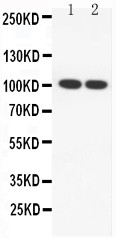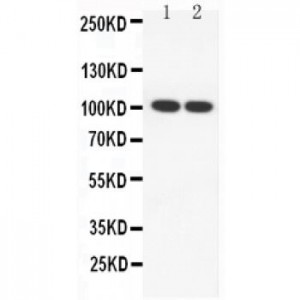More info
Overview
Long Name | Antibody Type | Antibody Isotype | Host | Species Reactivity | Validated Applications | Purification |
| SP100 nuclear antigen | Polyclonal | IgG | Rabbit | Human | WB | Immunogen affinity purified. |
Immunogen | ||||||
| A synthetic peptide corresponding to a sequence at the C-terminus of human SP100(664-677aa YTLKVLMENKFLPE). | ||||||
Properties
Form | Lyophilized |
Size | 100 µg/vial |
Contents | Antibody is lyophilized with 5 mg BSA, 0.9 mg NaCl, 0.2 mg Na2HPO4, 0.05 mg Thimerosal and 0.05 mg NaN3. *carrier free antibody available upon request. |
Concentration | Reconstitute with 0.2 mL sterile dH2O (500 µg/ml final concentration). |
Storage | At -20 °C for 12 months, as supplied. Store reconstituted antibody at 2-8 °C for one month. For long-term storage, aliquot and store at -20 °C. Avoid repeated freezing and thawing. |
Additional Information Regarding the Antigen
Gene | SP100 |
Protein | Nuclear autoantigen Sp-100 |
Uniprot ID | P23497 |
Function | Together with PML, this tumor suppressor is a major constituent of the PML bodies, a subnuclear organelle involved in a large number of physiological processes including cell growth, differentiation and apoptosis. Functions as a transcriptional coactivator of ETS1 and ETS2 according to PubMed:11909962. Under certain conditions, it may also act as a corepressor of ETS1 preventing its binding to DNA according to PubMed:15247905. Through the regulation of ETS1 it may play a role in angiogenesis, controlling endothelial cell motility and invasion. Through interaction with the MRN complex it may be involved in the regulation of telomeres lengthening. May also regulate TP53- mediated transcription and through CASP8AP2, regulate FAS-mediated apoptosis. Also plays a role in infection by viruses, including human cytomegalovirus and Epstein-Barr virus, through mechanisms that may involve chromatin and/or transcriptional regulation. |
Tissue Specificity | Widely expressed. Sp100-B is expressed only in spleen, tonsil, thymus, mature B-cell line and some T-cell line, but not in brain, liver, muscle or non-lymphoid cell lines. |
Sub-cellular localization | Nucleus. Nucleus, PML body. Cytoplasm. Note: Differences in the subnuclear localization of the different isoforms seem to exist and may also be cell cycle- and interferon- dependent. Accumulates in the cytoplasm upon FAS activation. |
Sequence Similarities | Contains 2 HMG box DNA-binding domains. |
Aliases | DKFZp686E07254 antibody|FLJ00340 antibody|FLJ34579 antibody|K297 antibody|Lysp100b antibody|MYL antibody|Nuclear antigen Sp100 antibody|Nuclear autoantigen Sp 100 antibody|Nuclear autoantigen Sp-100 antibody|Nuclear autoantigen Sp100 antibody|Nuclear dot associated Sp100 protein antibody|Nuclear dot-associated Sp100 protein antibody|PP8675 antibody|Probable transcription factor PML antibody|Promyelocytic leukemia inducer of antibody|RING finger protein 71 antibody|RNF71 antibody|SP 100 antibody|SP100 antibody|SP100 HMG nuclear autoantigen antibody|SP100 nuclear antigen antibody|Speckled 100 kDa antibody|TRIM19 antibody|Tripartite motif protein TRIM19 antibody |
Application Details
| Application | Concentration* | Species | Validated Using** |
| Western blot | 0.1-0.5μg/ml | Human | AssaySolutio's ECL kit |
AssaySolution recommends Rabbit Chemiluminescent WB Detection Kit (AKIT001B) for Western blot. *Blocking peptide can be purchased at $65. Contact us for more information

Anti-SP100 antibody, ASA-B1765, All Western blotting
All lanes: Anti-SP100(ASA-B1765) at 0.5ug/ml
Lane 1: U937 Whole Cell Lysate at 40ug
Lane 2: HEPG2 Whole Cell Lysate at 40ug
Predicted bind size: 100KD
Observed bind size: 100KD
All lanes: Anti-SP100(ASA-B1765) at 0.5ug/ml
Lane 1: U937 Whole Cell Lysate at 40ug
Lane 2: HEPG2 Whole Cell Lysate at 40ug
Predicted bind size: 100KD
Observed bind size: 100KD



